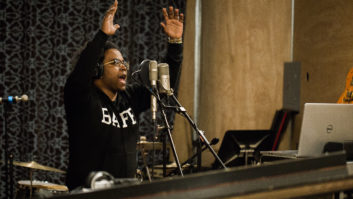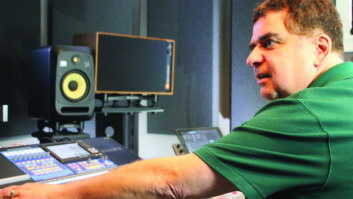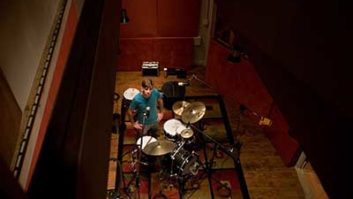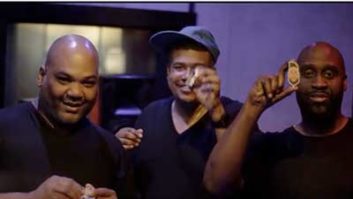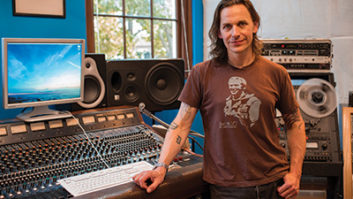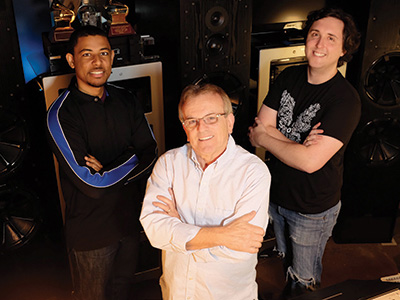
Vlado Meller Mastering, Charleston, S.C.
A few years back, we wrote about Vlado Meller relocating his mastering operation to Truphonic Recording in Charleston, S.C., after nearly 40 years in Manhattan, most of them with Sony. In checking in for an update, we find that he was flying out the next day for the Latin Grammys, with a nomination for Andrea Bocelli’s Cinema. He had finished up Lou Reed’s 15-CD remastered collection a few months back, mastered the new A Tribe Called Quest release that was up on iTunes two days later, Celine Dion, Harry Connick, Jr…. There is no shortage of label work.
But what has excited him in the intervening two years is the uptick in local Charleston independent work, much of it coming through Truphonic for tracking and mixing. “This is a complete studio, from A-to-Z,” Meller says. “Tracking, mixing, mastering, live recording for radio. It’s nice to see it come back to how we all started. I spent over 30 years at Sony, so you can see why I appreciate the setup. It’s all in one building.”
The one thing missing, however, is a cutting lathe, When he first moved to Charleston, only the major labels were asking for a vinyl master. Now, the independents are, too, and Meller is providing a vinyl master for every project, just not cutting it. And his clients are having to wait up to 120 days at the pressing plant due to high demand. That is likely to change by early 2017, as he has started eyeing prices on a Neumann VMS70. And he has a place in Florida that he trusts to press the records.
“The local bands are blown away when they first hear an EQ’d master,” Meller says. “They just haven’t been exposed to the process. They no longer have to go to Atlanta or New York. I’ve been cutting vinyl for 37 years, and I will go toe-to-toe with anyone in a shootout.”
Meanwhile at Truphonic, engineer Elliot Elsey has been awfully busy of late with local projects, along with the occasional live date to air with radio station The Bridge, featuring David Gray, Band of Horses and others in recent months.
Local acts, all mastered by Meller, include Sonder Blue, tracked at Truphonic by Elliott Elsey, mixed by Joey Cox; Stop Light Observations, tracked by Elsey; Magnificent Crumb; Mark Bryan; Sikheira, recorded and mixed at Truphonic by Elsey; Shoelaces (artist Casey Malanuk/producer John-Keith Culbreth from Stop Light Observations), Elsey and Joey Cox each mixed one track; Glenn Jordan, 4-song EP, Medicated Society, recorded, edited, and mixed by Elliott Elsey (also co-produced).
MICHAEL GRAVES’ OSIRIS MASTERING, ATLANTA
Mastering engineer Michael Graves operates out of his home studio, Osiris Mastering, where he’s developed a reputation for the careful restoration of decades-old recordings, as well as mastering new recordings for regional artists.

Michael Graves
Graves has an ongoing working relationship with Omnivore Records; this started with the Grammy Award-winning release of Hank Williams’ The Garden Spot Programs, 1950 (2014). “Somebody found an old 16-inch transcription record at an estate sale,” Graves says. “These were unreleased recordings.”
More recently, Graves has remastered Omnivore’s reissues of Big Star’s Third, collections from the Buck Owens and Don Rich archives, and more. So, in any given week, Graves may be handed a challenging assortment of source material. That’s why his essential gear starts with playback.
“My turntable is the Technics SP15, which was only sold to radio stations until the late ’80s,” he says. “They’re based off of the SL1200 DJ turntables, but these also play 78s and allow for a longer tone arm, so we can play those 16-inch transcription records.”
Graves’ studio also contains Technics 1500 series tape machines, his Dangerous Music mastering console, Wavelab 9 Pro workstation, Bowers & Wilkins 805 monitors, and a variety of converter and plug-in options to facilitate mastering in the box.
“While I master in the box, I have treated my whole listening environment, because that’s what’s most important to me,” Graves says. “Early on, I decided that what is most important is starting by making sure I can hear things the way I’m supposed to hear them.”
SUN STUDIOS, MEMPHIS
At the historic Sun Studio, engineers Ples Hampton and Curry Weber produced and recorded an EP for 10-piece rock ‘n’ roll band Matt Stansberry & The Romance; the performances will also appear as part of the studio’s ongoing Sun Sessions series on PBS.

Curry Weber and Ples Hampton recording hand claps
Photo: Nathan Poppe
“They showed up for the [studio] tour one day,” Hampton says. “We run tours from 10 to 6:30, then flip the studio for recording at night. We told them that we give free tours to bands in exchange for a piece of music or merch.” Stansberry presented Hampton with his band’s new vinyl release, and Hampton enjoyed it so much that he encouraged the band to come back and record.
Hampton and Curry had been sharing engineering duties at Sun, following the departure of former chief engineer Matt Ross-Spang. Their work includes continuing the mission Ross-Spang began, of restoring the studio technology to its original 1950s condition.
“We gutted Sam’s RCA 76D broadcast consolette and outfitted it with ’50s-era RCA preamps, recapped with new tubes, and built a new power supply,” Hampton explains. “We built individual inputs and outputs to work with Pro Tools and are working on a variable summing mixer that will allow it to work with six inputs and a single output for the Ampex 350 [tape machine], which is how Sam recorded.”
Using designs exhibited in the Memphis Rock and Soul Museum, Hampton and Curry have also built a replica of Phillips’ original mono speaker, “When we want to use Sam’s exact same slapback method, we run the two Ampex 350s we have,” Hampton says. “There was quite a bit of Sam’s slapback on the Matt Stansberry project.”
A few more choice details from the session: “We liked the RCA consolette preamps for organ and drums,” Hampton recalls. “We had our two RCA 77s for lead vocals and two RCA 44s as overheads on drums and electric guitar. It was awesome, helping the band understand that they weren’t in some modern studio, and had to play down some of their louder songs. It turned harder, funkier tunes into more chill, almost jazzy numbers.”
SESSIONS: SOUTHEAST
ARDENT STUDIOS, MEMPHIS

Low Cut Connie frontman Adam Weiner
Photo: George Murphy
Ardent Studios recently hosted sessions with alt-rock band Deer Tick and engineer/producer Adam Landry. The band worked on their upcoming sixth album in Studios A and C, making use of the studio’s long-held collection of classic gear.
Earlier this year, indie rock ‘n’ roll band Low Cut Connie were in Studio C, tracking a pair of albums for release on Contender Records next year. Both projects were engineered by Adam Hill and Dave Chale, and produced by frontman Adam Weiner, along with Hill and Chale.
“Our guitarist James Everhart was honored to use [Big Star guitarist] Chris Bell’s electric guitar on some of the songs,” says Weiner. “I played a couple different pianos, including the gorgeous Yamaha grand. We had an antique vibraphone on a tune, and used Ardent’s famous Mellotron, which was used on Big Star Third. There were also a bunch of drunk pizza-guzzling degenerates clapping and screaming on a few songs. Studio C has some magic vibrations and energy and it got wild and frothy in there. Lots of sweat and crying. Always a pleasure to make records at Ardent.”
PARHELION RECORDING STUDIOS, ATLANTA

Ludacris (center) with Childish Major (left) and DJ Famous
At Parhelion Recording Studios, noise band Whores finished up recording and mixing their latest album for eOne Records. Other recent sessions include: Ludacris tracking new songs with DJ Infamous and Childish Major producing; singer Lloyd putting the finishing touches on his new release; singer J Holiday adding vocals to a Stafford Brothers production. And last but never least, Cee Lo recorded a new song called “My Favorite MC’s” that was released in September.
THE MUSIC SHED, NEW ORLEANS

L-R: Roger Niven, Bobby Macdonald, Ben Lorio, and Iain Clark
Scottish band Twisted Blues was in The Music Shed to record with staff engineer Ben Lorio (Galactic, Jason Marsalis, Trombone Shorty). Pictured here are Roger Niven (guitar and vocals), Bobby Macdonald (bass and vocals), Ben Lorio (Engineer), and former Uriah Heap member Iain Clark (drums). The busy Music Shed is equipped with Pro Tools HD3, a Trident 80B console, ATC 100 speakers and more.
RUBBER ROOM, CHAPEL HILL, N.C.

Jerry Brown
Celebrating its 20th year offering engineering and mastering services, Rubber Room specializes in Southern roots and string-band music. Artists who have had the pleasure of working in engineer/owner Jerry Brown’s Chapel Hill facility include the Mountain Goats, Ben Folds Five, Lucinda Williams, and most recently, alt-roots group Mandolin Orange, who self-produced their latest album, Blindfaller, there with Brown recording, mixing and mastering.
ROYAL STUDIOS, MEMPHIS

Lawrence “Boo” Mitchell at the MCI console
At Willie Mitchell’s Royal Studios, chief engineer Lawrence “Boo” Mitchell engineered Melissa Etheridge’s album of soul covers, Memphis Rock and Soul, this past spring; Etheridge co-produced with John Burk. Last month, Royal hosted jazz singer Dee Dee Bridgewater. And just weeks before we went to press, Mitchell was in the studio with artist/producer/former Eurythmic Dave Stewart.
